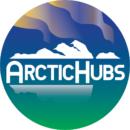Participatory research tools: Q-methodology to study perspectives
As used in ArcticHubs, Q-method is being conducted as part of the in-depth analysis of local people’s perception of the existing and new economic activities in the Arctic. It is being used in particular to assess local stakeholders, policy makers and citizens’ perceptions, in order to identify and cluster like-minded people into so-called opinion types. This makes viewpoints across different parts of the Arctic region and industries comparable. Hereafter a …
